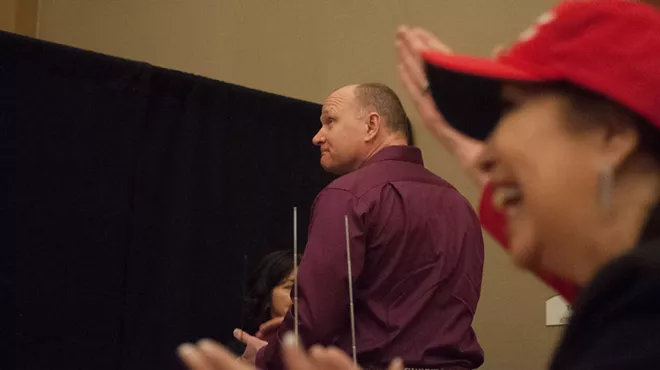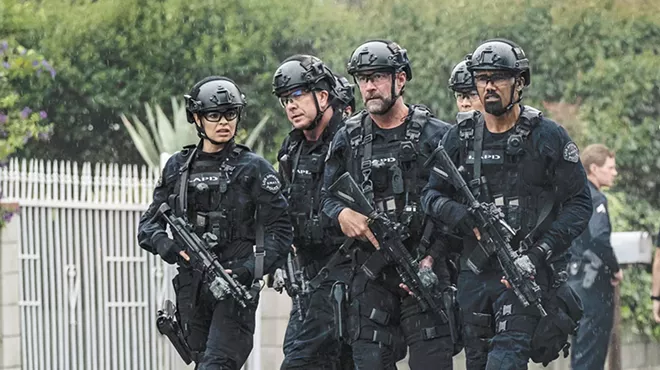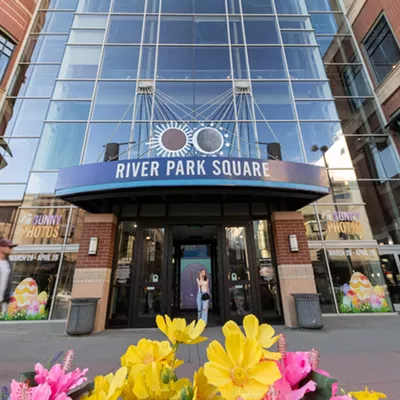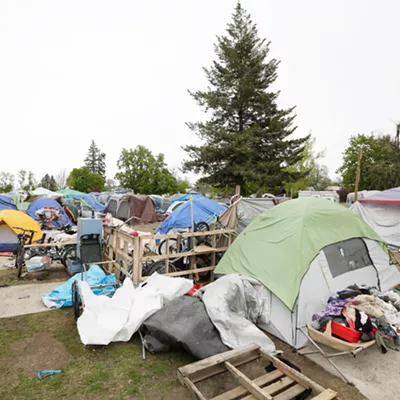
Live PD — the controversial A&E reality show that often starred Spokane County residents being arrested by local sheriff's deputies — was supposed to come back to Spokane this summer, according to Spokane County Sheriff Ozzie Knezovich.
But not anymore. On Wednesday, A&E canceled Live PD in the wake of the international protests calling for sweeping police reform after Minneapolis police killed George Floyd, a black man.
Knezovich wasn't happy.
"We live in a 'cancel culture' right now," Knezovich says. "It seems we're vastly eroding our freedoms ourselves. We're taking away our own constitutional protections. Any viewpoint, any voice that is counter or different is wiped out. Live PD, well, it doesn't fit today's narrative. Live PD showed that, in the vast majority of police contacts, things go well."
Constitutional protections, of course, are what gives platforms and publishers like A&E the right to choose what to air or not air on their network, including canceling Live PD. But "cancel culture" generally refers to a broader phenomenon of companies responding to outrage on social media about controversial views, statements or actions by firing or penalizing those being called out.
"It's sad to watch networks bow to the pressures of the keyboard," Knezovich says. "But that's the society we live in now. ... OK, so you're going to what? Expunge any favorable reference to police work or police officers from the cultural landscape of America?"
In the last two weeks, a stream of TV critics have published essays critical of police-oriented TV shows, accusing them of effectively being "copaganda" by portraying police officers as square-jawed heroes. Even Paw Patrol, the cartoon kids show with a canine cop, has come under some not-entirely-satirical criticism.
("Save Paw Patrol," Knezovich writes in a text message to the Inlander.)
But shows like COPS and Live PD were controversial long before this moment — including in Spokane.
It was former Spokane City Council legislative assistant Adam McDaniel's birthday when COPS was canceled.Anyone else missing the Spokane Sheriff's K9 Unit? 😍 #k9khan #LivePD #LivePDNation #k9soflivepd #Spokane pic.twitter.com/K11OwrrRKI
— K9sOfLivePD (@K9sOfLivePD) April 23, 2018
McDaniel was the council assistant who led the charge against shows like Live PD and COPS back in 2018.
"It was about protecting the folks who were being shown as a character on these shows, and making sure they had the opportunity to consent," McDaniel says.
He says he found research showing that reality-based TV shows overrepresented violent crime, overrepresented minorities as perpetrators of crimes, and overrepresented the number of arrests that actually ended with guilty verdicts.
Stuckart argued it wasn't censorship, because it wasn't really news. It was a reality show.
"They’re cutting and editing and giving the police departments the ability to say what’s going to be on air or not," Stuckart says.
And there was another concern: Live PD was making Spokane look awful, precisely when the community was trying to recruit new businesses and investment.
On the other hand, it was making the Sheriff's Office look great. Spokane sheriff's deputies became minor celebrities in the Live PD Twitter world, with fans cooing over the hunkiness of some of the law enforcement officers even as they mocked the methheads and drunks of Spokane.
Thank you! We think they do a great job! So happy to be back on #LivePD 💙💙💙 https://t.co/5dmkFLNM5X
— SpokaneSheriffOffice (@SpokaneSheriff) November 12, 2017
"We got a lot of lateral police officers who wanted to come to work here because of the professionalism they saw on that show," Knezovich says.
"This thing has tapped into something that I can't explain," Knezovich told the podcast. "I've never seen anything like it before. Not in 28 years."
Taberski's podcast is a multi-episode critique about the problems with COPS and Live PD, pointing out that Live PD sometimes films suspects without their consent. Besides, he says, drunk people can't give consent.
He had interviewed a Spokane woman who was filmed by Live PD shirtless in her bra — Live PD blurred her face, but her friends still recognized her — who says she's been targetted repeatedly by Live PD's producers.
But that footage never aired on Live PD. Instead, producers destroyed the footage after 30 days, as outlined with the contract with the agency.
The footage was recorded on the officer's body camera. But if it had happened in Spokane County? Spokane Sheriff's deputies still don't have body cams.
But none of the events of the last few weeks has caused Knezovich to doubt his previous praise for Live PD.
"'Oh, it's making us look bad.' No, maybe it's exposing exactly the way things are, and you're afraid you might have to fix the problem. It's easier to just keep it shoved under the rug," Knezovich previously said on Running from COPS. "'It shows people at their worst'? No, it shows what we're dealing with. It shows what society is dealing with."
Of course, the end of COPS and Live PD isn't the end of live and raw broadcast interactions between police officers and the citizenry. It just that now it's often the protesters against the police who are controlling the camera angles and the editing.
And they're showing a cacophony of brutality, from drive-by pepper spraying to police driving their vehicles into protesters.
Congratulations @OfficialLivePD @danabrams @TomMorrisJr1 @Sean_C_Larkin on your 💯th episode from Sheriff Knezovich @SheriffOzzie & all of us! Great job sharing the amazing work of all the men/women in LE with all of the incredible #LivePD viewers. #ThankYou #LivePDNation 💙💙 pic.twitter.com/HkiUczLMDE
— SpokaneSheriffOffice (@SpokaneSheriff) March 10, 2018
























